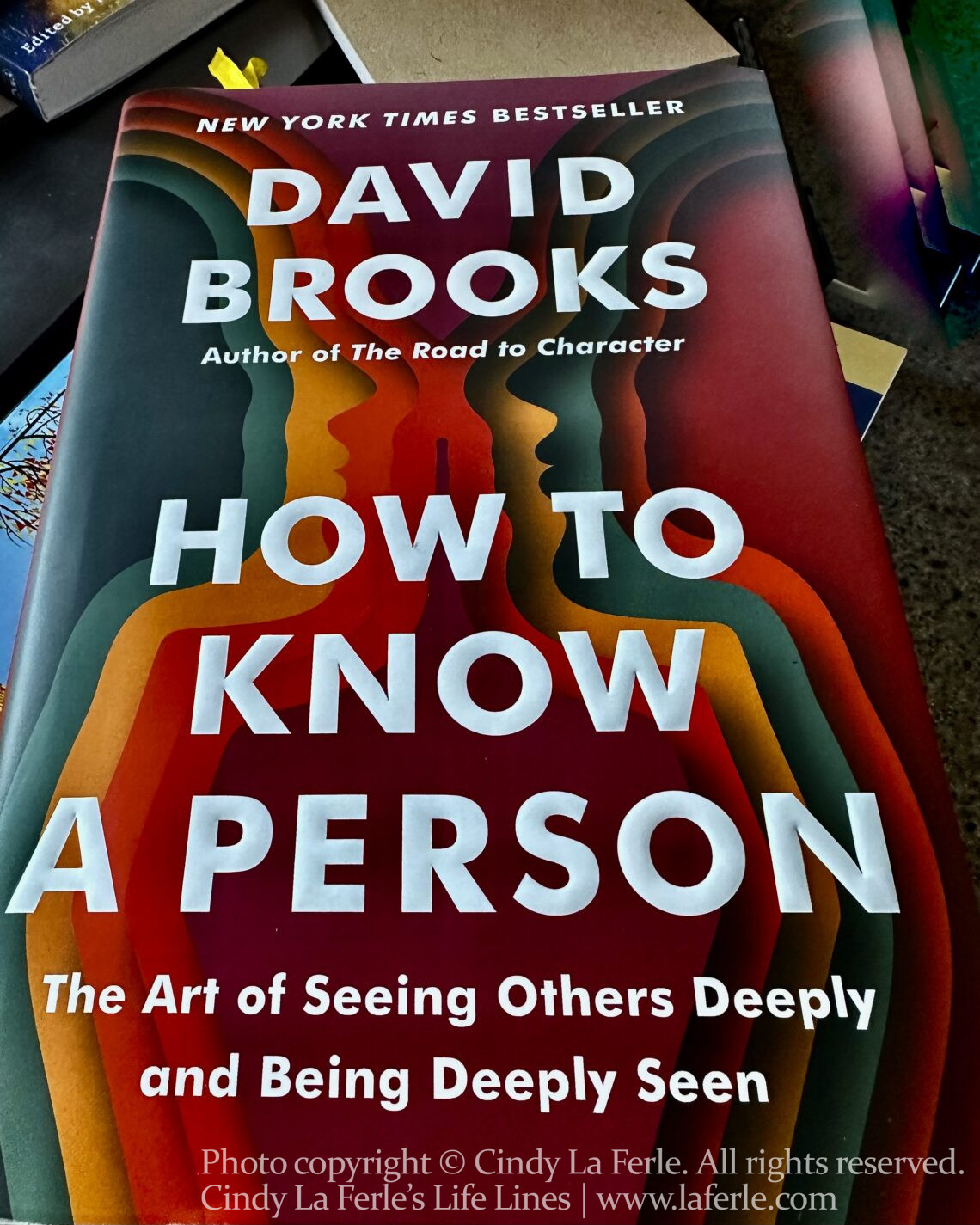
How to Know a Person
“Being open-hearted is a prerequisite for being a full, kind, and wise human being. But it is not enough. People need social skills.” ~David Brooks
As author David Brooks sees it, so much of our current national angst results from the “fraying of our social fabric.” Put simply, we’ve forgotten how to talk with each other. We’ve forgotten how to listen to each other.
At the same time, too many of us feel unseen and misunderstood. Worse yet, mental health statistics show that we’re feeling lonelier than ever. Social media may have given us more connections — and nearly unlimited access to others — but the quality of those relationships isn’t as satisfying as we’d hoped. Clearly, leaving messages online isn’t the same as having a real conversation and a deeper exchange with another human being, in person.
“Our social skills are currently inadequate to the pluralistic societies we are living in,” writes Brooks in his important best-seller, How to Know a Person: The Art of Seeing Others Deeply and Being Deeply Seen. “In my job as a journalist, I often find myself interviewing people who tell me they feel invisible and disrespected.”
One of the nation’s leading commentators, Brooks is an op-ed columnist for The New York Times and a writer for The Atlantic. In addition, he’s a regular on PBS NewsHour and is the best-selling author of several books on the human condition. He’s earned his place as an expert in the social sciences.
To research How to Know a Person, Brooks took a deep dive into the fields of psychology, philosophy, neuroscience, history, and education. He wanted to learn what drives human relationships, reaching as far back as our individual ancestry to solve the puzzle. In other words, this isn’t your ordinary, feel-good self-help book — if you could even label it as such. Surprisingly, it’s not a difficult read, partly because the author’s self-deprecating humor and engaging voice carry the material effortlessly.
Upfront, Brooks states frankly that few of us excel at making others feel “valued, heard, and understood.” Spoiler alert: Even if you think you’ve got the gift of gab and some empathy to spare, Brooks is going to show you otherwise. Be prepared to feel humbled. His book walks us carefully through the reasons how and why most of us usually fail — and gives us the tools we need to become better at communicating with other people.
You’ll learn, for starters, how to spot the difference between what Brooks calls “Diminishers” and “Illuminators” in all sorts of social situations. As you might guess, Diminishers are self-absorbed, and typically see other people as an audience, not as individuals to be respected and understood. On the other hand, Brooks writes, Illuminators have a persistent curiosity about other people. “They have been trained, or have trained themselves in the craft of understanding others. They know what to look for and how to ask the right questions at the right time.”
Illuminators know how to spark a good conversation. As Brooks points out, a good conversation is not a group of people making a series of statements at each other. “In fact, that’s a bad conversation,” he says. Brooks defines a good talk as “an act of joint exploration” and offers a practical list of 10 things you should (or shouldn’t) do when you’re talking with someone.
Among his tips: A good conversationalist is “a loud listener” — an active listener. “You want to be listening so actively that you’re practically burning calories,” Brooks explains. And don’t fear the pause, he adds. Wait for the other person to finish making a point, then pause for a moment to consider how you’ll respond.
And just as you might expect, one-upping is a huge turnoff. Or, as Brooks puts it, “Don’t be a topper.” If someone shares an achievement with you, for instance, set your ego aside. Don’t try to top or hijack the conversation with your own story about a similar achievement. There’s nothing wrong with building on a shared connection, but try to do so without shifting the conversation back to yourself. Ask thoughtful questions, and reflect on what you’ve heard. Validate the person who is speaking.
When we set our egos aside and look for the value in others — even those with whom we disagree — we grow and discover something larger and better in ourselves, Brooks reminds us.
I promise you’ll see other people differently, more compassionately, after you’ve finished this book — whether you’d like to improve your relationships at work, meet more friends, or make peace with your family. I enjoyed it so much that I’ve purchased it for loved ones, and I believe it should be required reading for anyone who cares about getting along with others. ~CL





4 Comments
Candice Hill
Hello, Cindy…I bought this book, and am so grateful you recommended it. It’s given me so much more understanding of people, and where they are coming from. It’s helped me, not take offense, when someone is rude or short with me. I am trying to see people better. Thank you so much.
PS I love your daily entries, I look so forward to them. You always seem to hit on something, that I’m thinking about. Thank you for that, too!!
Sincerely, Candy
Cindy La Ferle
Thank you so much, Candy! I’m so pleased to know you got the book and that it resonated as much with you as it did with me. Have a great day!
Courtney Gabridge
Hi Cindy, hope all is well!!! Thanks for the book recommendation, I’m going to order it!!! Sounds very interesting :))
Cindy La Ferle
Hi Courtney!
I was thinking about you recently — how wonderful to hear from you, thank you.